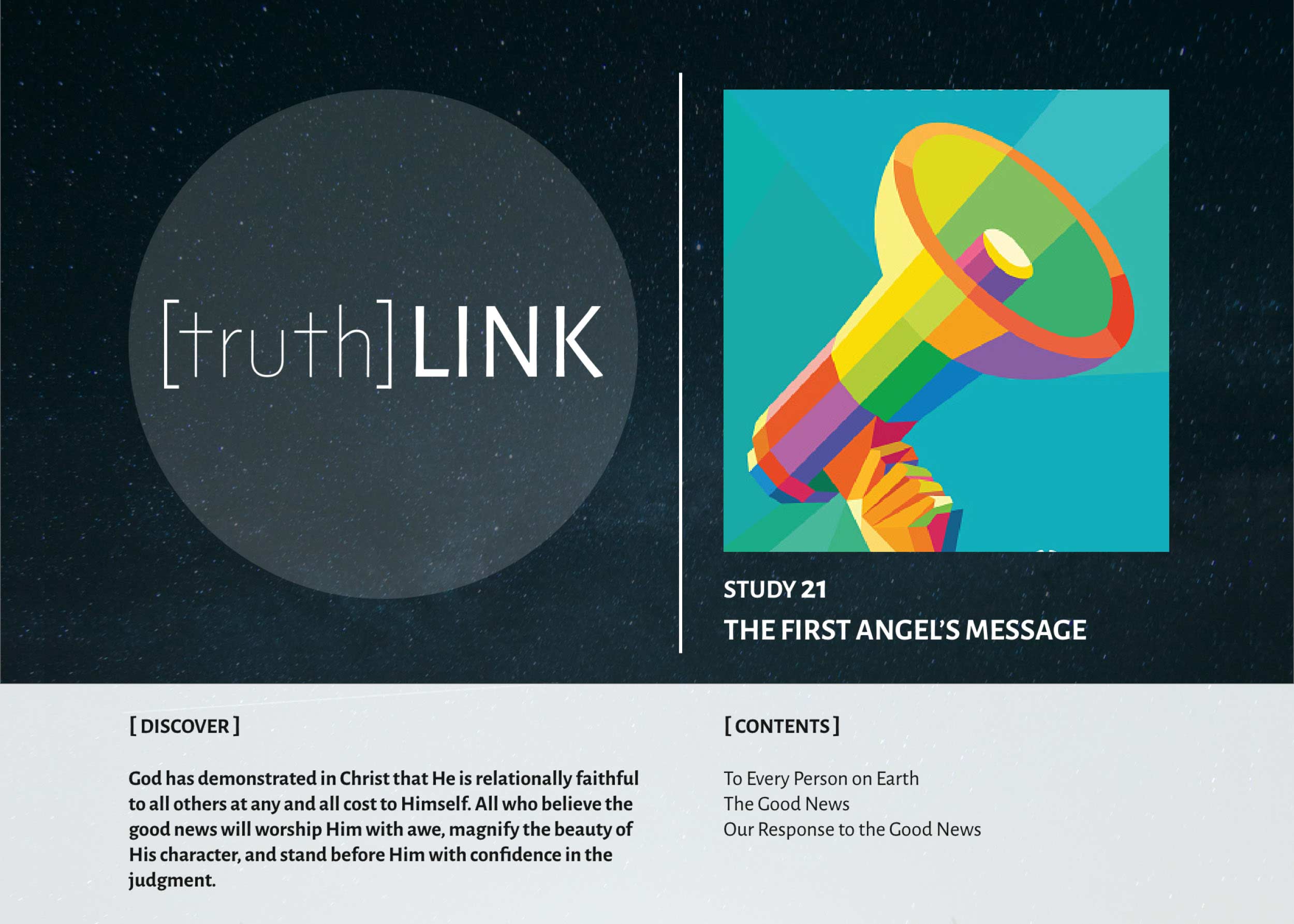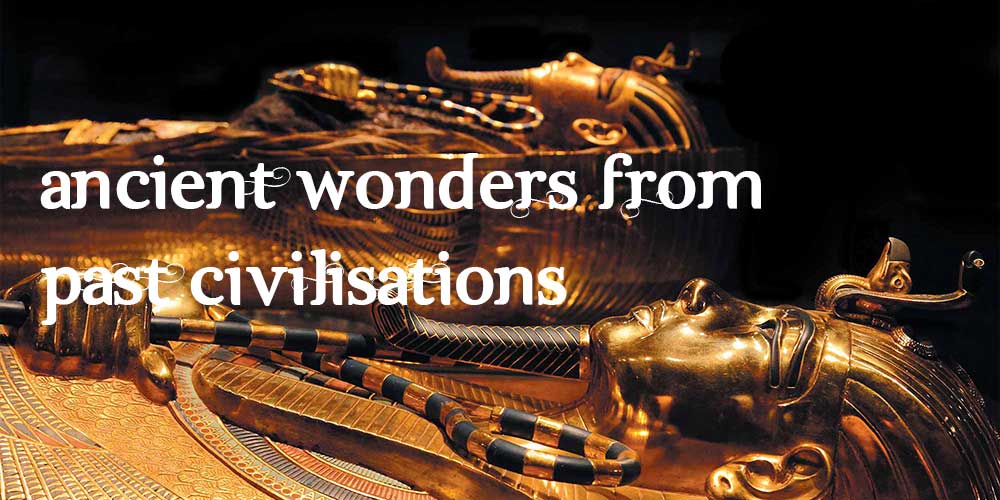
To Every Person on Earth
In Revelation 14:6-12 we encounter a series of three angels flying over the earth proclaiming God’s last message to humanity, symbolizing the work of God’s church just prior to the second coming of Christ (verses 14-20). In this [truth] Link study guide we will explore the first angel’s message.
READ THE FIRST ANGEL’S MESSAGE IN REVELATION 14:6-7 AND NOTICE ITS FIVE PARTS:
1. the everlasting _____________
2. ________ God
3. and give __________ to Him
4. for the hour of His ________________ has come
5. and _______________ Him who _________ heaven and earth
After working through each of the five sections below, return to the top of each section and write in your own one-sentence explanation of the subject covered.

The Good News
1. THE EVERLASTING GOSPEL = ____.
The word “gospel” simply means good news. The word “everlasting” means eternal or always. So the “everlasting gospel” tells us something super positive about God that has always been true and always will be true. But what? Notice how Jeremiah 31:3 uses the word everlasting:
“Yes, I have ________ you with an everlasting _______; therefore with _________ I have drawn you.”
The word here translated “lovingkindness” is chesed in Hebrew. It means faithfulness or unfailing love. The gospel is the truth of God’s faithful love toward us expressed through Jesus. Speaking of the content of the gospel, Paul says that “in it the righteousness of God is revealed” (Romans 1:17). The gospel is good news because it reveals the kind of God that God is; it opens His character to our understanding; it discloses the way God thinks and feels and behaves in relation to us as sinners. And it’s good news because, it turns out, God is righteous in the way He relates to us.
“Righteousness” is a biblical word that basically equates to the idea of relational faithfulness or an unbroken pattern of other-centeredness (Hosea 2:19-20; Psalm 36:5-8; 37:21; 40:10; 143:1). When the Bible says that God is righteous it means that God always does what is right for others (Deuteronomy 32:4; Zephaniah 3:5). Righteousness is described as living by faith (Habakuk 2:4; Romans 1:16) and as faith working by love (Galatians 5:5-6). The word righteousness is closely associated with the concept of covenant keeping (Isaiah 42:6; Daniel 9:4, 7). From His side of the relationship, regardless of what we do, God maintains relational integrity (Lamentations 3:22-23; Isaiah 11:5; 2 Timothy 2:13). He remains faithful to us no matter what pain to Himself that faithfulness necessitates. This is why the righteousness of Christ led Him to the cross (Isaiah 53:11; Romans 5:8). The question that hung before the universe was, Does God love others more than Himself? The cross answered the question with a resounding, Yes! When Jesus breathed His last agonizing breath at Calvary without exerting His power to perform a single act of retaliation or self-preservation, it was proven beyond all doubt that God loves all others above and before Himself. This is why Paul pointed to the self-sacrificing death of Christ on the cross as the very gospel itself. At the cross we see the ultimate enactment of the righteousness of God’s character in putting all others first (1 Corinthians 1:9, 17-18; 2:2; 15:1-4). And that’s the gospel in all its sublime beauty!
So, then, what does God’s righteousness (His faithful love) mean for us on a practical level?
READ AND DISCUSS ROMANS 3:20-31 for Paul’s explanation of God’s righteousness as the basis of our salvation. Carefully think through what Paul is saying in this passage, because it is the best news you will ever hear. All of us are guilty sinners and if left to ourselves our sin and guilt will destroy us. And yet, because of “God’s righteousness”—the faithfulness of His character that moves Him to keep on loving us in spite of our guilt—He has chosen to give us a justified standing of innocence before Him at the cost of great suffering on His part. We are made righteous by means of God’s righteousness!
This, Paul says, is the good news! And this, says the first angel’s message, is what God’s end-time church is to proclaim to every person on earth.
Our Response to the Good News
2. FEAR GOD =___________.
Why, then, in this tremendously positive context would the first angel’s message go on to say, “Fear God?”
The word fear is used two ways in the Bible. In one usage it is a negative fear, like terror, that evil people who persist in evil ought to feel at the thought of a righteous God to whom they are ultimately accountable (Psalm 9:20; 14:4-6; 36:1-3; Isaiah 33:14). The second way the word fear is used is in the sense of being awestruck at God’s mercy and goodness (Psalm 22:23; 25:14; 31:19; 33:8, 18; 40:3-4; 89:7; 115:11; Psalm 130:4). The “fear-God” proclamation of the first angel may mean “be afraid” or “be awestruck.” Both are possible emotional responses to God. It all depends on whether the individual person having the encounter senses guilt or innocence before God. According to 1 John 4:16-19, when we know and believe the love God has for us—the gospel—the terror kind of fear is cast out of our hearts and we experience confidence before God. So, for those who believe the gospel, the first angel’s message says, In the light of the good news of God’s faithful love for you, be amazed with awe at who God is and what He’s done for you.
3. GIVE GLORY TO HIM = ___________.
The word “glory” (doxa) literally means to declare a high opinion, judgment, or view of a person. In this case, we are called upon to give glory to God in the light of the gospel. The glory of God is His good character (Exodus 33:18-19). To give glory to God is to proclaim, in word and deed, the beautiful reality of His goodness, confessing that our “righteousness and sanctification and redemption” are all from the Lord and not of our own manufacturing (1 Corinthians 1:30-31; Matthew 5:16).
4. THE HOUR OF HIS JUDGMENT = ___________.
The first angel goes on to announce, “for the hour of His judgment has come.” God has appointed a time for the final judgment of humanity, which Jesus and Paul knew to be future to their time (Matthew 12:36; Acts 17:31). In Acts 24:24-25 Paul reasoned with Felix of the “judgment to come.” The first angel’s message is proclaimed to those who are living during that juncture of history when “the hour of His judgment has come.”
Some people make bad news out of the judgment, but actually it’s good news. The prophet Daniel tells us why. First, when God’s final judgment happens, “the beast”—Daniel’s term for the antichrist system that wages war against God and His people—will be “slain” (Daniel 7:9-11). Second, “judgment” will be “made in favor of the saints of the Most High” (Daniel 7:21-22). In the light of God’s faithful love for us, we can have “boldness in the Day of Judgment” (1 John 4:16-17). That’s why the judgment is good new —because the Judge is just and good in all His judgments (Psalm 9:8; Isaiah 33:22)
5. WORSHIP HIM WHO MADE = _________.
This part of the first angel’s message quotes from the fourth commandment, the one regarding the Sabbath. Read Exodus 20:8-11 and discover why this message, which is for those living at the end-time segment of history, would direct our attention to the Sabbath. First, the Sabbath is the one commandment among the Ten that identifies the God of the biblical story as the Creator of all things, or Jesus Christ Himself (Exodus 20:8-11; Colossians 1:16-17; Mark 2:27-28). Secondly, the Sabbath teaches us to rest in dependence upon our Creator for salvation rather than work to earn it, which is the central truth of the gospel (Ephesians 2:8-10). And thirdly, the Sabbath logically fits in the historical context of the end-time message because, as we have discovered in study guide 17, a counterfeit system of Christianity has aligned itself against both the law and the gospel. By pointing to the Sabbath, the first angel’s message is calling the attention of the world to God’s downtrodden Law of love and to the rest we have in Christ alone for our salvation.
[CONNECT]
The gospel of Christ is a complete paradigm shift for the human mind.
Paul tells us that it is Satan’s special aim to put a mental veil over the gospel to block our view of God’s character, but in Jesus the light of God’s glory illuminates our hearts (2 Corinthians 4:3-6). All the religions of the world present the human predicament as one in which we must by some means ascend to God and save ourselves. By contrast, the gospel announces that God has come down to save us by virtue of His faithful love. Human religions offer good advice regarding what men and women ought to do, must do, had better do to lift themselves up, to save themselves, to win God’s favor. The gospel of Christ offers good news regarding what God has done for us in Christ because of the sheer goodness of His character. Mere good advice for behavior modification can only generate a sense of obligation to try harder and then impose more guilt when we fail. The good news of God’s faithful love revealed in Christ arouses a deep sense of gratitude and awe, awakening in us a desire to live for God’s glory. The natural motive to preserve self gives away to the new motive of love for God in the light of His love for us.
[EXPERIENCE]
What an amazing message this is! I want to be a part of getting the gospel out.
It is my decision to receive the first angel’s message into my own heart and to help share it with our world. Everybody needs to hear the good news of God’s faithful love, to be in awe of such an incredible God as this, to give Him glory for all He has done to save us, to worship Him as Creator and Savior, and to stand with assurance in the judgment. May my life point to Him!
Phone 1300 300 389























